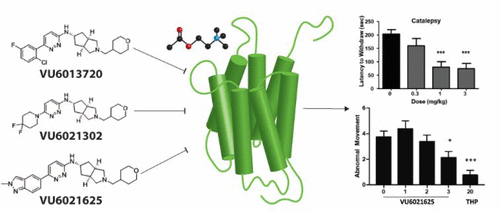当前位置:
X-MOL 学术
›
ACS Pharmacol. Transl. Sci.
›
论文详情
Our official English website, www.x-mol.net, welcomes your feedback! (Note: you will need to create a separate account there.)
Discovery of the First Selective M4 Muscarinic Acetylcholine Receptor Antagonists with in Vivo Antiparkinsonian and Antidystonic Efficacy
ACS Pharmacology & Translational Science Pub Date : 2021-08-02 , DOI: 10.1021/acsptsci.0c00162 Mark S Moehle 1, 2 , Aaron M Bender 1 , Jonathan W Dickerson 1 , Daniel J Foster 1, 3 , Aidong Qi 1 , Hyekyung P Cho 1 , Yuping Donsante 4 , Weimin Peng 1 , Zoey Bryant 1 , Kaylee J Stillwell 1 , Thomas M Bridges 1 , Sichen Chang 1 , Katherine J Watson 1 , Jordan C O'Neill 1 , Julie L Engers 1 , Li Peng 1 , Alice L Rodriguez 1 , Colleen M Niswender 1, 3 , Craig W Lindsley 1 , Ellen J Hess 4 , P Jeffrey Conn 1, 3 , Jerri M Rook 1
ACS Pharmacology & Translational Science Pub Date : 2021-08-02 , DOI: 10.1021/acsptsci.0c00162 Mark S Moehle 1, 2 , Aaron M Bender 1 , Jonathan W Dickerson 1 , Daniel J Foster 1, 3 , Aidong Qi 1 , Hyekyung P Cho 1 , Yuping Donsante 4 , Weimin Peng 1 , Zoey Bryant 1 , Kaylee J Stillwell 1 , Thomas M Bridges 1 , Sichen Chang 1 , Katherine J Watson 1 , Jordan C O'Neill 1 , Julie L Engers 1 , Li Peng 1 , Alice L Rodriguez 1 , Colleen M Niswender 1, 3 , Craig W Lindsley 1 , Ellen J Hess 4 , P Jeffrey Conn 1, 3 , Jerri M Rook 1
Affiliation

|
Nonselective antagonists of muscarinic acetylcholine receptors (mAChRs) that broadly inhibit all five mAChR subtypes provide an efficacious treatment for some movement disorders, including Parkinson’s disease and dystonia. Despite their efficacy in these and other central nervous system disorders, antimuscarinic therapy has limited utility due to severe adverse effects that often limit their tolerability by patients. Recent advances in understanding the roles that each mAChR subtype plays in disease pathology suggest that highly selective ligands for individual subtypes may underlie the antiparkinsonian and antidystonic efficacy observed with the use of nonselective antimuscarinic therapeutics. Our recent work has indicated that the M4 muscarinic acetylcholine receptor has several important roles in opposing aberrant neurotransmitter release, intracellular signaling pathways, and brain circuits associated with movement disorders. This raises the possibility that selective antagonists of M4 may recapitulate the efficacy of nonselective antimuscarinic therapeutics and may decrease or eliminate the adverse effects associated with these drugs. However, this has not been directly tested due to lack of selective antagonists of M4. Here, we utilize genetic mAChR knockout animals in combination with nonselective mAChR antagonists to confirm that the M4 receptor activation is required for the locomotor-stimulating and antiparkinsonian efficacy in rodent models. We also report the synthesis, discovery, and characterization of the first-in-class selective M4 antagonists VU6013720, VU6021302, and VU6021625 and confirm that these optimized compounds have antiparkinsonian and antidystonic efficacy in pharmacological and genetic models of movement disorders.
中文翻译:

发现第一个具有体内抗帕金森病和抗肌张力障碍功效的选择性 M4 毒蕈碱型乙酰胆碱受体拮抗剂
广泛抑制所有五种 mAChR 亚型的毒蕈碱性乙酰胆碱受体 (mAChR) 的非选择性拮抗剂为一些运动障碍提供了有效的治疗,包括帕金森病和肌张力障碍。尽管它们在这些和其他中枢神经系统疾病中有效,但抗毒蕈碱疗法的实用性有限,因为严重的副作用通常会限制患者对它们的耐受性。在了解每种 mAChR 亚型在疾病病理学中的作用方面的最新进展表明,针对个体亚型的高选择性配体可能是使用非选择性抗毒蕈碱疗法观察到的抗帕金森病和抗肌张力障碍功效的基础。我们最近的工作表明 M 4毒蕈碱性乙酰胆碱受体在对抗异常神经递质释放、细胞内信号通路和与运动障碍相关的脑回路中具有几个重要作用。这提高了 M 4的选择性拮抗剂可能重现非选择性抗毒蕈碱疗法的功效并可能减少或消除与这些药物相关的副作用的可能性。然而,由于缺乏 M 4的选择性拮抗剂,这还没有被直接测试。在这里,我们利用遗传 mAChR 敲除动物结合非选择性 mAChR 拮抗剂来确认 M 4在啮齿动物模型中,运动刺激和抗帕金森病功效需要受体激活。我们还报告了一流的选择性 M 4拮抗剂 VU6013720、VU6021302 和 VU6021625 的合成、发现和表征,并确认这些优化的化合物在运动障碍的药理学和遗传模型中具有抗帕金森病和抗肌张力障碍的功效。
更新日期:2021-08-13
中文翻译:

发现第一个具有体内抗帕金森病和抗肌张力障碍功效的选择性 M4 毒蕈碱型乙酰胆碱受体拮抗剂
广泛抑制所有五种 mAChR 亚型的毒蕈碱性乙酰胆碱受体 (mAChR) 的非选择性拮抗剂为一些运动障碍提供了有效的治疗,包括帕金森病和肌张力障碍。尽管它们在这些和其他中枢神经系统疾病中有效,但抗毒蕈碱疗法的实用性有限,因为严重的副作用通常会限制患者对它们的耐受性。在了解每种 mAChR 亚型在疾病病理学中的作用方面的最新进展表明,针对个体亚型的高选择性配体可能是使用非选择性抗毒蕈碱疗法观察到的抗帕金森病和抗肌张力障碍功效的基础。我们最近的工作表明 M 4毒蕈碱性乙酰胆碱受体在对抗异常神经递质释放、细胞内信号通路和与运动障碍相关的脑回路中具有几个重要作用。这提高了 M 4的选择性拮抗剂可能重现非选择性抗毒蕈碱疗法的功效并可能减少或消除与这些药物相关的副作用的可能性。然而,由于缺乏 M 4的选择性拮抗剂,这还没有被直接测试。在这里,我们利用遗传 mAChR 敲除动物结合非选择性 mAChR 拮抗剂来确认 M 4在啮齿动物模型中,运动刺激和抗帕金森病功效需要受体激活。我们还报告了一流的选择性 M 4拮抗剂 VU6013720、VU6021302 和 VU6021625 的合成、发现和表征,并确认这些优化的化合物在运动障碍的药理学和遗传模型中具有抗帕金森病和抗肌张力障碍的功效。

























 京公网安备 11010802027423号
京公网安备 11010802027423号